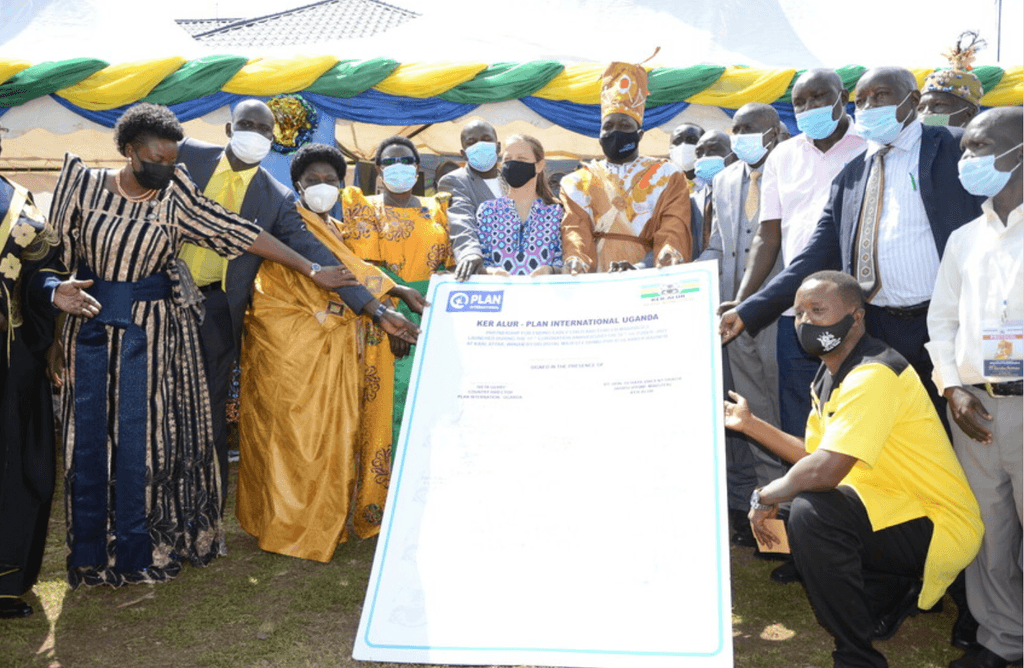Rewriting tradition to end child marriage in Uganda
In Uganda’s West Nile region, communities are reshaping the future for adolescent girls. A cultural shift is underway—one that blends tradition with transformation to keep girls in school and out of early marriages.

During the coronation of the 11th King of Alur, His Highness Phillip Olarker Rauni III, a new chapter began. Local leaders, elders, and families came together to challenge long-standing norms and practices that had contributed to child, early, and forced marriages in Zombo District.
Why this matters
Child marriage remains a significant issue in Uganda, particularly in rural areas where poverty, gender inequality, and harmful social norms persist. In Zombo District, nearly half of all girls were once married before the age of 18.
But that’s changing. Communities are now united around a shared goal: to protect girls’ rights, keep them in school, and empower them to shape their own futures.
Culture as a catalyst for change
What makes this initiative unique is its deep respect for culture. Rather than working against traditional structures, communities have worked through them, especially with the support of the Alur Kingdom.
Together, they’ve developed the Alur Customary Marriage Guidelines, a bold new framework that, among other guidelines, prohibits marriage under the age of 18, requires age verification before issuing marriage certificates and penalises forced and child marriages with fines and legal action.
Since their adoption, child marriage rates in the Alur community have dropped from 44.9% to 33%.
Empowering girls through opportunity
Across the West Nile region, efforts to keep girls in school and empower youth economically have gained momentum. Community-led initiatives have improved access to education, vocational training, and sexual and reproductive health information.
Between 2020 and 2024:
- SRHR knowledge among adolescents rose from 18.3% to 81.9%
- 63.3% of youth are now earning an income
- 86.7% of girls with disabilities involved in local initiatives are employed or self-employed
- Over 3,200 out-of-school children were supported to return to school
These outcomes reflect the collective efforts of families, youth groups, traditional leaders, and local organisations with the support of broader development partnerships, including the Plan International’s Girls Get Equal: End Child, Early and Forced Marriage programme, funded by NORAD and implemented in collaboration with local actors across Adjumani, Pakwach, Nebbi, and Zombo.
Changing norms, one conversation at a time
From the Queen’s Cup football gala to community barazas and radio talk shows, communities are sparking open conversations about gender equality and girls’ rights. These platforms have helped build confidence among girls and encouraged boys and men to become allies.
Support for girls’ rights among boys has grown from 47.4% to 82.3%, showing a shift in attitudes across generations.
Impact at a glance (2020-2024)
- 👰♀️ Child marriage dropped from 44.9% to 33%
- 🧠 SRHR knowledge rose from 11.9% to 69.9%
- ♿ 57.4% of girls with disabilities now understand SRHR
- 💼 63.3% of youth are earning an income
- 🛡️ 93.3% of schools have child protection systems
- 🚨 700+ cases of abuse resolved or referred
- 👦🏽 Boys’ support for girls’ rights rose from 47.4% to 75.2%
Categories: Protection from violence, Sexual and reproductive health and rights
Rewriting tradition to end child marriage in Uganda
22 July 2025Categories: Protection from violence, Sexual and reproductive health and rights


